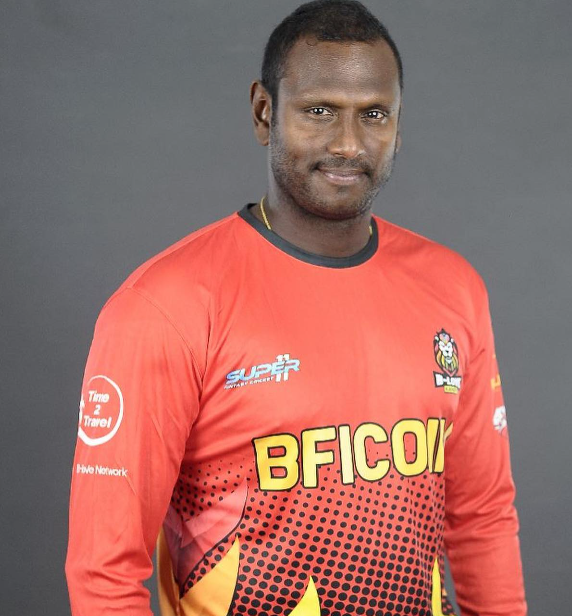Angelo Mathews Criticizes Ball Change During Crucial Phase of Sri Lanka’s Second Innings Against England
In the world of cricket, the condition of the ball can often be a game-changing factor, influencing the outcome of a match. This was precisely the case during the first Test between Sri Lanka and England in Manchester, where a controversial ball change during Sri Lanka’s second innings became a focal point of discussion.1
Angelo Mathews, Sri Lanka’s experienced batting all-rounder, openly criticized the decision, believing it had a significant impact on the match’s momentum.
Table of Contents
The Context: A Crucial Test Match
- The first Test between Sri Lanka and England was a hard-fought contest, with both teams displaying resilience and skill.
- After conceding a 122-run lead in the first innings, Sri Lanka found themselves in a difficult position, requiring a strong second innings performance to stay in the game.
- The team’s top order struggled initially, finding themselves at a precarious 1/2, but a determined effort from Angelo Mathews and Kamindu Mendis steadied the ship.
- By the time the controversial ball change occurred, Sri Lanka had battled back to a respectable 146/4 in 41 overs. Mathews, leading the fightback, had reached 59 runs, with Mendis providing solid support on 33.
- The duo was building a partnership that was crucial for Sri Lanka’s hopes of setting a challenging target for England.
The Ball Change: A Turning Point
The ball change took place during a drinks break on Day 3, a moment that Mathews later described as pivotal. The condition of the ball is a crucial aspect of Test cricket, particularly in England, where the ball tends to swing more than in other conditions.
The wear and tear of the ball can greatly influence how it behaves, with older balls often being more favorable to batsmen as they lose their hardness and shine.
The Impact on the Match
The new ball eventually led to Mathews’ dismissal for 65 runs, a crucial wicket that significantly dented Sri Lanka’s hopes of building a substantial lead. England capitalized on the breakthrough, taking the remaining wickets with relative ease and putting themselves in a strong position to win the match.
The Debate Over Ball Changes in Cricket
Mathews’ criticism touches on a broader debate in cricket regarding the fairness and timing of ball changes. According to the laws of cricket, the umpires can change the ball if it becomes damaged or lost its shape.2
View this post on Instagram
However, this rule has often been a point of contention, especially when the timing of the change coincides with crucial phases of a match.
Also Read: Angelo Mathews Innings Draws Comparison to Michael Vaughan 2014 Performance and Annual Conference
“It Could Be Unfair for Batters on Both Teams” – Angelo Mathews on Ball Changes
Angelo Mathews, known for his cricketing experience and calm demeanor, didn’t shy away from expressing his concerns regarding the timing of ball changes during crucial moments in a match.3
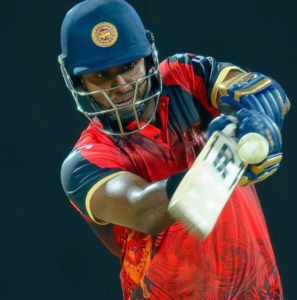
Following the first Test against England in Manchester, where a mid-innings ball change had a significant impact, Mathews highlighted a broader issue within the sport. He stressed that such ball changes could be unfair not just for his team, but for batters on both sides who work hard to overcome the challenges posed by a new ball.
The New Ball Storm: A Test of Skill and Patience
In Test cricket, the first few overs with a new ball are often the most challenging for batters. The fresh seam and shine on the ball allow it to swing and seam more, making it difficult for even the most skilled batsmen to settle in.
Once the initial period is weathered, the ball begins to lose its hardness, and batting typically becomes easier. This shift marks a crucial phase in any Test match, as teams look to build partnerships and score runs more freely.
Drawing Parallels with the Ashes: A Recurring Issue
Mathews’ concerns are not isolated. He drew parallels to a similar situation that occurred during the final Ashes Test at the Oval last year, where England benefited from a ball change that many believed swung the match in their favor.
During that game, the ball was changed under controversial circumstances, and the new ball immediately provided the English bowlers with an edge that they hadn’t enjoyed for several overs. This shift allowed England to dominate the remainder of the match, ultimately winning and leveling the series.
The Fairness Debate: Impact on Both Sides
Mathews’ critique of ball changes touches on a fundamental issue of fairness in cricket. He emphasized that while his team may have suffered from the ball change in Manchester, the same could easily happen to the opposition in another context.
The unpredictability of when and how a ball might be changed can disrupt the flow of the game for both teams, making it an issue that affects all players, regardless of which side they are on.

Angelo Mathews: A Pillar of Sri Lankan Cricket
Angelo Davis Mathews was born on June 2, 1987, in Colombo, Sri Lanka. Growing up in a cricket-loving nation, Mathews was drawn to the sport from a young age. He attended St. Joseph’s College in Colombo, a school known for its rich cricketing tradition.
It was here that Mathews honed his skills as both a batsman and a bowler, eventually becoming one of the most promising young cricketers in the country.
💔 Angelo Mathews misses out on his well deserved double century just by one run!
SL 397 all out (A Mathews 199, D Chandimal 66, K Mendis 54 : Nayeem 6/105, Shakib 3/60)#BANvSL pic.twitter.com/6EO0ctu0mF
— Sri Lanka Cricket 🇱🇰 (@OfficialSLC) May 16, 2022
Rise to Prominence
Mathews’ talent was evident from his early days in school cricket, and it wasn’t long before he caught the attention of national selectors. He represented Sri Lanka in the Under-19 team, where his performances further solidified his reputation as an emerging all-rounder.
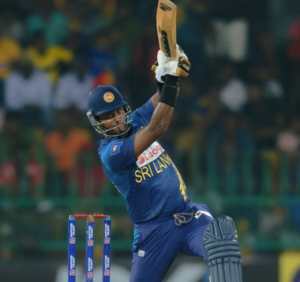
Mathews made his first-class debut in 2006, and within a few years, he was knocking on the doors of the national team. His consistent performances in domestic cricket earned him a place in the Sri Lankan squad for the ICC World Twenty20 in 2009, where he made an immediate impact.
International Debut and Early Success
Angelo Mathews made his One Day International (ODI) debut for Sri Lanka on November 18, 2008, against Zimbabwe. His Test debut followed shortly after, on July 4, 2009, against Pakistan. From the outset, Mathews displayed a calm and composed demeanor, both with the bat and ball.
Leadership and the 2011 ICC Cricket World Cup
As Mathews’ career progressed, so did his responsibilities within the team. His consistent performances and leadership qualities saw him being appointed as the vice-captain of the Sri Lankan team.
He was a vital member of the squad during the 2011 ICC Cricket World Cup, where Sri Lanka made it to the final, only to be defeated by India. Mathews’ contributions with both bat and ball were crucial throughout the tournament, although an injury kept him out of the final match.
Also Read: Haris Rauf (Cricketer) Bio, Age, Career, Net Worth, Personal Life And More
Angelo Mathews: Evolution of an International Cricket Career
Angelo Mathews made his international debut for Sri Lanka in late 2008, stepping onto the field with high expectations and ambitions.
His debut in One Day Internationals (ODIs) came on November 18, 2008, against Zimbabwe, where his all-around capabilities quickly caught the attention of cricket enthusiasts and experts alike. A few months later, Mathews made his Test debut against Pakistan on July 4, 2009.
Rise as a Key Player
- Mathews’ early years in international cricket saw him contributing significantly with both bat and ball. His ability to deliver under pressure became evident during the ICC Champions Trophy in 2009, where he played a pivotal role in Sri Lanka’s journey to the final.
- His match-winning performances included crucial knocks and timely breakthroughs with the ball, which quickly established him as a dependable player for Sri Lanka.
- One of Mathews’ memorable early performances came in a Test match against Australia in 2010, where he scored a match-saving 77* in the second innings to help Sri Lanka secure a draw.
- This innings showcased his temperament and ability to perform under pressure, qualities that would become hallmarks of his career.
Transition to a Batting Mainstay
As Mathews’ career progressed, it became evident that his batting was his stronger suit. The demands of international cricket and a series of injuries, particularly to his hamstrings, led him to gradually reduce his bowling workload.
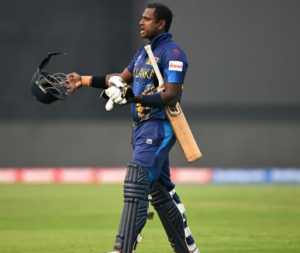
By 2014, Mathews had transitioned into a role where he primarily focused on his batting, especially in Test cricket, while still contributing as a part-time bowler in limited-overs formats.
Captaincy and Further Evolution
In 2013, Mathews was handed the captaincy of the Sri Lankan national team, taking over from Mahela Jayawardene. His leadership coincided with some of the most successful periods in Sri Lankan cricket, including a historic Test series win in England in 2014.
During this series, Mathews played one of the finest innings of his career, scoring a career-best 160 at Headingley to help Sri Lanka secure a famous victory.
Personal Life of Angelo Mathews: A Glimpse Beyond the Cricket Field
Angelo Mathews, born on June 2, 1987, in Colombo, Sri Lanka, comes from a diverse and culturally rich background. He is the son of Tyronne Mathews, a Tamil, and Monica Mathews, a Burgher.
This multicultural heritage has played a significant role in shaping Mathews’ identity and outlook on life. Raised in Colombo, Mathews grew up in a supportive and loving environment that fostered his early passion for cricket.
Education and Faith
Mathews attended St. Joseph’s College, one of the most prestigious schools in Colombo, known for its strong academic and sports programs. It was here that Mathews’ cricketing talent began to shine. The college has a rich cricketing tradition, and Mathews’ skills were honed under the guidance of experienced coaches and mentors.
In addition to his education, Mathews is a devout Roman Catholic, a faith that has been a cornerstone of his personal life. His religious beliefs have provided him with a strong moral foundation, which he credits as a guiding force throughout his cricketing career.
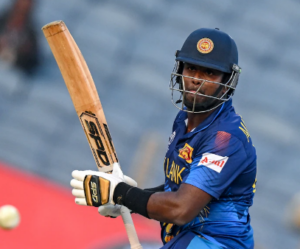
Marriage and Family Life
On July 18, 2013, Angelo Mathews married Heshanie Silva, his lifelong partner. The wedding was a grand affair, held at the Cinnamon Grand Hotel in Colombo, and attended by many prominent figures, including former President Mahinda Rajapakse.
The couple’s relationship is rooted in deep mutual respect and understanding, and Heshanie has been a steadfast support to Mathews throughout his career.
Influence of Family on Career
Mathews often credits his family for being a pillar of support in his journey as a cricketer. His parents, Tyronne and Monica, played a crucial role in nurturing his early interest in the sport, while his wife Heshanie has been a constant source of encouragement and stability.
Mathews’ family life is characterized by strong values, love, and mutual respect, which have been instrumental in his success on and off the field.

FAQ’S
1. What was the issue Angelo Mathews had with the ball change during the 1st Test against England?
Ans: Angelo Mathews expressed frustration over the decision to change the ball during the 1st Test against England. He believed that the ball replacement negatively impacted the performance of the Sri Lankan bowlers, affecting their ability to maintain control and swing.
2. When did the ball change occur during the match, and why was it changed?
Ans: The ball change occurred after the umpires inspected it and deemed it unfit for further play, either due to damage or being out of shape. This is a standard procedure in cricket, but the timing and effect of the change raised concerns from Mathews and the Sri Lankan team.
3. How did the ball change affect Sri Lanka’s performance in the match?
Ans: According to Angelo Mathews, the ball change disrupted Sri Lanka’s momentum. The bowlers struggled to adapt to the new ball, which he claimed did not behave in the same way as the original one, leading to a shift in England’s batting performance.
4. What was the reaction of the match officials to Angelo Mathews’ complaints?
Ans: The match officials acknowledged the ball change but maintained that it was necessary according to the rules. While Mathews voiced his displeasure, the officials did not reverse the decision or take further action.
5. Did Angelo Mathews or the Sri Lankan team take any formal action regarding the ball change?
Ans: As of the latest updates, Angelo Mathews and the Sri Lankan team raised their concerns during the match, but there were no reports of a formal complaint being lodged with the match referee or the International Cricket Council (ICC) regarding the incident.
Read More: Haris Rauf (Cricketer) Bio, Age, Career, Net Worth, Personal Life And More
